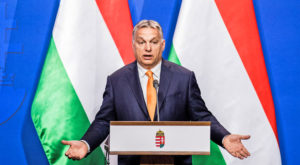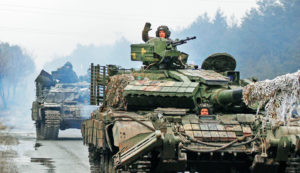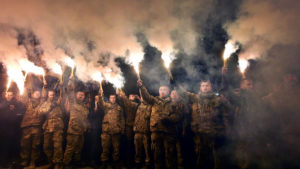Budapest
In the 12 years of rule that have followed three landslide electoral victories, Viktor Orbán, now Europe’s longest-serving leader, has successfully reshaped Hungary in his own image: too successfully, in the eyes of both the weak and fractured opposition and of the EU mainstream.
Hungary is not the dictatorship Orbán’s more strident critics allege, but it departs from the stated norms of European liberal democracy in a number of ways. Under his leadership, the ruling Fidesz party has placed its thumb on the electoral scales, ensuring that while elections are free, the government enters them at an advantage. Opposition candidates are given significantly less airtime on state broadcasting networks than government figures, with the result that Fidesz narratives dominate the airwaves; the opposition claims that electoral boundaries have been redrawn to favour the government, a charge that Fidesz disputes; and a sophisticated politics of patronage has created a new conservative elite which owes its survival to Orbán’s continued rule.
It is precisely these same innovations, which make Orbán’s Hungary anathema to Western liberals, that make the country so attractive to so many Western conservatives — particularly Anglo-Saxon ones. Where conservatives in Britain and America can win elections but find their governance impeded by a liberal powerbase in the media, NGOs and the judiciary (termed by conservative Hungarian intellectuals as an anti-democratic “juristocracy”), in Orbán’s Hungary the liberal intelligentsia’s political powerbase has been dismantled and replaced with a confident new conservative elite. A wealth of glossy conservative magazines, universities, think tanks and NGOs are the lavishly-funded product of Orbán’s Gramscian conservativism.
Rather than the vulgar 20th-century authoritarianism with which his more excitable critics charge him, Orbán’s dominance of Hungary’s politics is a subtler, more postmodern exercise. A product of George Soros’s attempt to nurture an elite governing class in Central Europe, the disaffected liberal reformer has adopted and inverted the same methods that produce liberal hegemony towards distinctly post-liberal ends. No wonder so many Western conservatives, who cannot translate electoral success to meaningful political power, find Orbán’s Hungary an object of both envy and inspiration. At Gólya, a far-Left cooperative and cultural space in a disused Budapest warehouse bedecked with PKK flags, I met the Marxist journalist and leftwing activist Csaba Tóth, who wryly described Orbán’s Hungary as “Rojava for western conservatives”, an idealised polity onto which they can project their political hopes and dreams.
“The point about Fidesz,” Tóth told me, “is that they’re against this liberal Deep State, NGO elite, whatever you want to call it. But they are mesmerised by it, and they are trying to replicate it along their own political lines. So they will have their own NGOs, their own think tanks, their own societies and international influence, modelled after this Atlanticist elite.” This creates a system, Tóth claims, where “I don’t think there is a level playing field now in elections. There’s kind of a controlled press in which there’s very little administrative measures against the opposition press, but on the other hand, pro-government media is very heavily rewarded, even from state funds… [This means] there is an economic and political power centre that is overwhelming and couldn’t really make another power centre come about.”
Before her election as Hungary’s first female president last month, the then Fidesz Vice-President Katalin Novák suggested to me that Western European politics is itself undemocratic, as government policy is driven by a “very, very powerful NGO network, which drives this kind of ongoing aggression against those countries who would like to step out of line in migration and all these big liberal trends dominating European policy today”. In Hungary, due to the government’s use of direct referendums to enshrine policy (such as the question on LGBT education in schools, which is also on the ballot on Sunday’s election), Novák claims politics is more democratic in practice than the European mainstream: “I don’t think that in Western Europe politicians would dare to hold a referendum about migration.”
Struggling to make headway against this consolidated conservative system, six of Hungary’s opposition parties have united in a fractious and unwieldy coalition to unseat Orbán, under the titular leadership of Péter Márki-Zay, a gaffe-prone, small-town mayor and Catholic conservative. Dominated by social and economic liberals but encompassing parties as disparate as the social-democratic Socialist party on the one hand, and the until-recently fascist Jobbik party, which has put aside its black uniforms for a centre-right rebranding, on the other, the opposition are united in an awkward marriage of convenience by one goal only: to depose Orbán. And to do so, their campaign has settled on an unexpected lightning rod issue: the war in Ukraine.
There are few things that can focus a voter’s attention more than a bloody war in a neighbouring country, and Orbán’s long-standing policy of amicable relations with Putin’s Russia makes the issue more pointed here than anywhere else in Europe. At an opposition hustings event this week in Budapest’s Széll Kálmán square — until 2011 Moscow Square — where a crowd of perhaps 200 people had gathered to hear the opposition leaders’ speeches, I asked the neatly-suited, smoothly Atlanticist Márki-Zay how the Ukraine war was feeding into his election campaign.
“Many people just woke up that Orbán’s best friend is a war criminal who’s killing kids, who’s shooting at nuclear power plants,” Márki-Zay told me. “So of course, now Putin is responsible for the war in Ukraine and Orbán is responsible for supporting Putin. Orbán has been a traitor of Europe, has been a traitor of Nato and of course, a traitor of Hungary for 12 years.”
Hungary’s opposition has focused on attacking Orbán for his non-interventionist stance in the Ukraine war. While the Fidesz government has agreed to EU sanctions against Russia and sends humanitarian aid to Ukraine, as well as accepting hundreds of thousands of Ukrainian refugees, it refuses to deliver Ukraine weapons or to allow Hungary to be used as a transit point for weapons deliveries from other Nato countries. In return, Fidesz has accused the opposition of being reckless interventionists, eager to embroil Hungarians in a war whose outcome is uncertain, and to torpedo Hungarian living standards by shutting the country off from its energy supplier Russia.
“Unfortunately Orbán controls 90% of the media environment in Hungary,” Márki-Zay asserted, “so he is now attacking the opposition [saying] that we would send untrained kids to die in Ukraine in this war.” So would a Márki-Zay government intervene in Ukraine, I asked? “I will always support Nato’s position because we have to be a loyal member of Nato. We can only rely on defending Hungary with Nato troops in Hungary, which Orbán first denied and then allowed. And then he was also attacking us with allowing arms shipments to Ukraine and [then] Orbán decreed that they can cross Hungary,” he replied. “[He is] a pathetic liar, of course, Orbán, who’s always saying one thing today and changing his mind tomorrow. He was a communist, a liberal, a conservative — and now he’s building a fascist Putinist faction in the European Parliament.”
Also at the event was Anna Júlia Donáth, a young MEP and leader of the liberal Momentum party, which failed to reach the 5% threshold for representation in Hungary’s last parliamentary election. A scion of a liberal political dynasty, former project manager for an NGO dealing with migrant rights, and member of an EU parliament committee concerned with LGBT issues, Donáth is a Fidesz opponent straight from central casting. I asked her how the Ukraine question was playing in the election campaign.
“It’s about the war of narratives,” she replied, “Orbán builds up a new narrative, which, of course, for us is like a 180-degree change from what he said 24 hours before. But in his communication machine, it works. Yes, indeed, right now, he is a peacemaker. Three weeks ago, he was the most pro-Putin person in Europe.”
Struggling to get the opposition’s message across in the election campaign, Donáth was not sanguine about her coalition’s chances. “Sometimes we really feel like we are fighting against a machine which is impossible to win against,” she told me. “Because they have everything, they don’t just use their own budget. They’re using the state budget for campaigning; this is ridiculous. You can’t win against them.”
“Two thirds of the country,” she claimed, “are only receiving propaganda media, so they only get a reality built up by the government. And in that reality, they are the best and we are monsters. I can’t blame people for that. They don’t even want to ask questions anymore, because… the system has polarised society on such a level that we cannot even start talking to each other right now.”
The pre-election polls which a month ago were uncomfortably tight for the government now show Orbán pulling away by a comfortable margin. When I was last in Hungary during the first days of the Ukraine war, government officials were privately downbeat about their prospect of victory, cautioning against over-confident assumptions of success. Four weeks of campaigning later, they are feeling far more positive.
In an interview at the Scruton cafe at Budapest’s Matthias Corvinus Collegium — part of the flourishing ecosystem of elite conservative institutions created by Fidesz — Viktor Orbán’s strategic advisor Balász Orbán told me that the coming election was Hungary’s “most important ever since the transition period [from communism]” because “it’s about deciding between peace and war. It’s about deciding between peaceful cooperation or coexistence and ideological warfare… I think that the result will be obvious on Sunday, and then this whole turbulent period of time will go away.”
Do most Hungarians support the government’s anti-interventionist stance on Ukraine, I asked? “Yes, yes, yes,” he replied emphatically. “What I feel when I’m traveling all around the country, is that about the Ukrainian conflict, even those who are undecided voters, or who had some willingness to vote for the opposition, even those voting groups are saying that we support the government and government change is not a real option anymore.” Indeed, he added, “if you want to really understand why [the opposition] aren’t successful for like 10, 12 years, and why they’re going to lose the election, that’s the reason: because they think that everything is part of the political issue where they have to somehow get close and in line with the international mainstream liberal approach, but it goes against the majority of the Hungarians’ opinions, even those who are not in favour of Fidesz.”
But even if staying out of the war appeals to Hungarian voters, Orbán’s position on Ukraine is isolating the government from its closest allies in the EU, with Poland’s president Andrzej Duda stating that it is “hard for me to understand the approach” of Orbán towards Ukraine, and warning that “this policy will be costly for Hungary, very costly”. Similarly, Czechia’s defence minister Jana Černochová posted on Twitter that “I am very sorry that cheap Russian oil is now more important to Hungarian politicians than Ukrainian blood.” Even a planned meeting this week of V4 foreign ministers in Budapest was cancelled at the last minute by Orbán’s erstwhile Central European allies in protest at the Hungarian government’s stance.
For Hungary’s beleaguered opposition, the war in Ukraine must have seemed like a dramatic, emotive bolt from the blue that could turn the electoral tide in their favour. Ukraine’s President Zelenskyy has even singled out Hungary for criticism in a video address to EU leaders, though this intervention has been criticised in turn by Hungarian foreign minister Péter Szijjártó as an unwelcome attempt at “influencing the election results in Hungary.” Walking around Budapest, a liberal city in a conservative country, I saw election posters for Fidesz candidates defaced with the words “PUTIN KILLER”, and on the Buda side of the river, a display of emotionally powerful photographs of the carnage and destruction in Ukraine set up at a busy traffic intersection.
But for the electorate as a whole, the war seems to have instead prompted a rallying effect around Orbán’s message of stability and security in a newly-dangerous region, with voters apparently heeding his message that a more actively pro-Ukrainian stance would be “getting involved in a war that is not our war, in which we have nothing to gain and everything to lose”. Barring a major upset, Sunday’s polls look set to deliver a historic fourth consecutive term of office for Orbán and the consolidation of Hungary’s fascinating — if controversial — experiment in enshrining conservative cultural and political hegemony. The Orbán model may not, as liberals fear and some conservatives dream, be applicable outside of Hungary’s own unique historic and political context, but it seems for now firmly secure in the heart of Europe.
Disclaimer
Some of the posts we share are controversial and we do not necessarily agree with them in the whole extend. Sometimes we agree with the content or part of it but we do not agree with the narration or language. Nevertheless we find them somehow interesting, valuable and/or informative or we share them, because we strongly believe in freedom of speech, free press and journalism. We strongly encourage you to have a critical approach to all the content, do your own research and analysis to build your own opinion.
We would be glad to have your feedback.
Source: UnHerd Read the original article here: https://unherd.com




